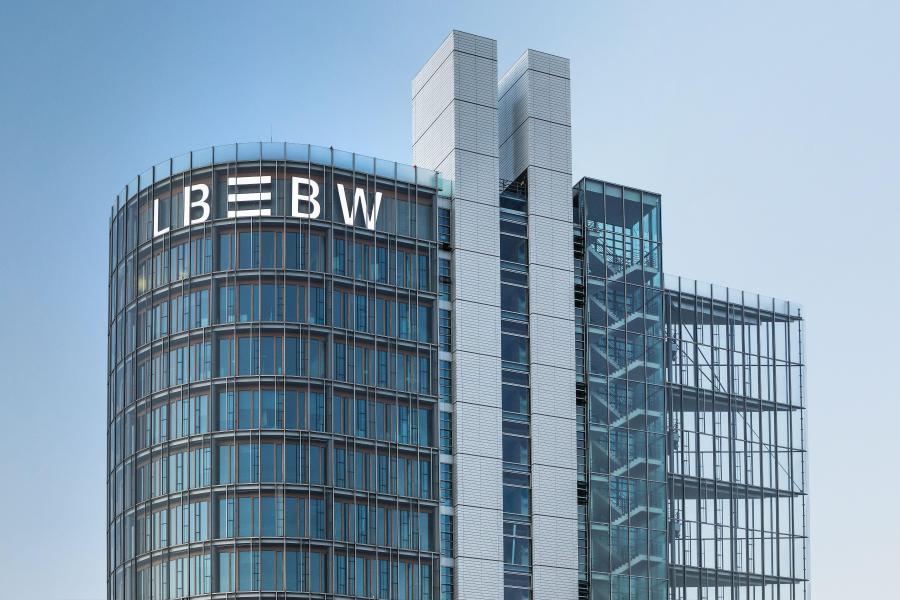
- LBBW will provide new loans of up to €350 million on favourable terms to companies building wind farms and solar plants.
- The EIB Group is providing a guarantee on a mezzanine tranche of €175 million in a synthetic securitisation operation, thus freeing up new lending capacity for LBBW.
- The agreement shows how green securitisation can support the REPowerEU objective of ending dependence on fossil fuels.
The European Investment Bank (EIB) Group is providing a €175 million guarantee to support LBBW’s lending in the renewable energy sector. The synthetic securitisation transaction will free up capital that will then be used to channel €350 million in new financing from LBBW for clean power projects, thus contributing to the decarbonisation of the German economy and to Europe’s energy independence. This is one of the first transactions of its kind in Germany.
The underlying reference portfolio amounts to €3.2 billion and consists of loans to small and medium-sized companies and other corporates originated by LBBW in its ordinary business. Guaranteeing this existing portfolio will provide capital relief for LBBW, freeing up additional lending capacity. The transaction is structured with a two-year replenishment period and falls under the simple, transparent, and standardised (STS) securitisation framework approved by the European Parliament.
Through a retrocession agreement, LBBW undertakes to convert this additional lending capacity into a new portfolio that is at least double the size of the mezzanine tranche guaranteed by the EIB, or €350 million. Renewable energy projects like wind farms and photovoltaic plants often have a maturity of 20 years or more. By generating a new portfolio fully dedicated to climate action and energy security-eligible financing backed by capital that is released on a standard corporate loan portfolio, this green securitisation shows how the use of proceeds concept can be applied to securitisation.
The amount allocated under this operation is expected to result in the development of about 340 MW of new electricity generation capacity from renewable sources, equivalent to the energy use of more than one million homes. The beneficiary companies will be in Germany, other EU Member States and Switzerland. The operation is fully in line with the EIB Group’s commitment to support the REPowerEU programme.
The EIB Group consists of the EIB and the European Investment Fund (EIF), which provides smaller companies with financing under favourable conditions. The new guarantee will be provided by the EIF to LBBW. A (back-to-back) counter guarantee from the EIB will fully mirror the EIF’s obligation, so that the EIB takes on the mezzanine tranche risk.
EIB Vice-President Ambroise Fayolle, who is responsible for operations in Germany, said: “Transactions like this one with LBBW support the decarbonisation of the energy sector and help the green transition to become a reality. I am glad that we can rely on LBBW as a trusted partner to provide the financial means needed by businesses in Germany in these challenging times.”
EIF Chief Executive Marjut Falkstedt added: “The EIF is pleased to be working with LBBW and the EIB to provide additional access to finance for renewable energy projects. The combination of the EIF’s investment and structuring expertise and the EIB’s efficient deployment of its own funds offers a competitive financing solution for LBBW that will serve to boost the green transition.”
Member of the Executive Management Board of LBBW Dr Christian Ricken said: “LBBW sees itself as a shaper of transformation. We want to support and advance the sustainable transformation of our economy. Synthetic securitisations are an excellent instrument to decisively expand the possibilities of our balance sheet for this purpose. We will now use the scope to significantly expand our activities in renewable energies.”
Background information:
The European Investment Bank (EIB)’s activities focus on the following priority areas: climate and environment, development, innovation and skills, small and medium-sized businesses, infrastructure and cohesion. The EIB works closely with other EU institutions to foster European integration, promote the development of the European Union and support EU policies in over 140 countries around the world.
The European Investment Fund (EIF) is part of the European Investment Bank Group. Its central mission is to support Europe's micro, small and medium-sized enterprises (SMEs) by helping them to access finance. The EIF designs and develops venture and growth capital, guarantees and microfinance instruments that specifically target this market segment. In this role, the EIF contributes to the pursuit of key EU policy objectives such as competitiveness and growth, innovation and digitalisation, social impact, skills and human capital, climate action and environmental sustainability and more.
The EIB and energy security
Over the past decade, the European Investment Bank Group has channelled more than €100 billion into the EU energy sector. These timely investments in energy efficiency, renewables, grids and storage are now helping Member States weather the crisis triggered by the abrupt cut in Russian gas supplies. In October 2022, the EIB Board of Directors decided to raise the Group’s clean energy financing volumes in support of the REPowerEU objective of ending Europe’s dependency on Russian fossil-fuel imports. As announced in July 2023, an additional €45 billion will be invested over the next five years, on top of the EIB’s already robust support for clean energy. It is estimated that the REPowerEU package will mobilise an additional €150 billion by 2027, thus making a substantial contribution to Europe’s energy independence and the EIB Group’s target to mobilise €1 trillion in climate financing this decade.
Landesbank Baden-Württemberg (LBBW) is both an SME-minded universal bank and the central bank of the savings banks in Baden-Württemberg, Saxony and Rhineland-Palatinate. With total assets of €324 billion and 10 000 employees (as of 31 December 2022), LBBW is one of the largest banks in Germany. Its core activities are corporate customers — particularly small and medium-sized enterprises — and private customers, as well as savings banks. Further emphasis is placed on real-estate financing and customer-oriented capital market business with banks, savings banks and institutional investors.